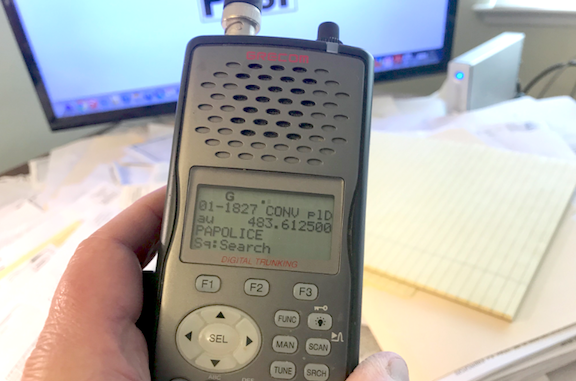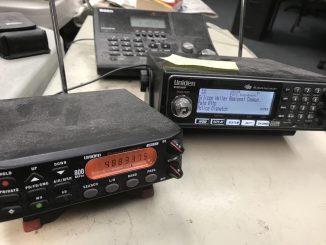
BY ELAINE GOODMAN
Daily Post Correspondent
The Berkeley Police Department’s decision on whether to keep one radio channel unencrypted will “absolutely” factor in the public’s and media’s wishes to be able to hear police activity, a Berkeley PD lieutenant said.
As the Post reported last week, the Berkeley PD is moving toward encryption of some of its radio channels to protect individuals’ personal information such as drivers license and Social Security numbers.
But the department may decide to keep one channel unencrypted, meaning the public can listen to officers’ activities.
That decision would be in contrast to the approach taken by police departments in Palo Alto, Mountain View and Los Altos, which fully encrypted their radio transmissions this year without any kind of public hearings or outreach to the community.
Berkeley police Lt. Peter Hong more recently told the Post that one consideration in the department’s encryption decision is maintaining public access to some radio transmissions.
“Absolutely that is a factor,” Hong said. “We’re in a community that wants information.”
The channel that Berkeley PD might keep unencrypted is the department’s channel 1, which is used for transmitting routine information, such as sending officers to a location where a robbery was reported.
Another channel, channel 3, is usually used when an officer asks for or receives information on an individual. That channel will be encrypted.
Urgent situations
The problem, according to Hong, is that personal information may sometimes go out over channel 1 in urgent situations. An example is if a dispatcher checks a vehicle license plate number and finds that the car is associated with a suspect in a felony robbery. In that case, dispatchers would want to give the officer information on the suspect right away using channel 1, rather than taking time to switch channels, Hong said.
“We have to navigate all this,” Hong said. “That’s why we’re undecided.”
The move toward encryption is in response to a California Department of Justice memo in October that told law enforcement agencies to take steps to protect individuals’ personally identifiable information, also known as PII, and criminal histories when using the California Law Enforcement Telecommunications System, or CLETS.
Encryption is one way to do that. But some law enforcement agencies, such as the San Francisco Police Department, are planning to keep some transmissions unencrypted and open to the public, as the Post reported previously.
Berkeley PD’s channel 3 is already protected using 40-bit encryption. But the DOJ is looking for more secure, 128-bit encryption, according to Hong.
Until the channel 3 encryption is upgraded, officers are taking steps to protect personal information.
Protecting personal information
One strategy is to break up an individual’s personal information by transmitting details such as a name, birthday and address in separate transmissions, or even in different channels, Berkeley PD said in a document that the Post obtained through a public records request.
Other strategies are to use a cell phone, landline, or patrol-car computer to transmit personal information.
Budget shortfalls may hamper Berkeley PD’s move to encryption, the document said. Hong said the department doesn’t have a time frame for its decision on leaving a channel unencrypted.
Berkeley is part of the East Bay Regional Communications System Authority, or EBRCSA, a radio system that operates under a joint powers agreement between Alameda and Contra Costa counties. EBRCSA owns and manages the digital radio system.
Each agency that’s part of EBRCSA is deciding for itself whether to encrypt its radio channels, according to EBRCSA Executive Director Tom McCarthy. The organization will support any agencies that decide to encrypt, he said.
“The agencies are creating their own policy and procedure on how to communicate the PII,” McCarthy told the Post.
Previous stories about the encryption of police radios
• Jan. 6, 2021, Police cut off their radio transmissions to the public
• Jan. 8, 2021, Editorial, Police decision to encrypt police radio transmissions reduces transparency
• Jan. 11, 2021, Mayor says that encrypting police radio signals was a mistake
• Feb. 14, 2021, Opinion, Encryption isn’t a ‘mandate,’ it’s a choice
• March 29, 2021, Police chief willing to consider alternatives to full encryption but lacks examples
• April 1, 2021, One city is reluctant to switch to encrypted police radio
• April 5, 2021, Palo Alto Police ask state if they can temporarily drop encryption
• May 24, 2021, San Francisco finds an alternative to full encryption of police radios



Thank you for your ongoing coverage of this issue. It’s obvious the Palo Alto police were too quick to switch to encryption and that they should have brought this to the City Council. Berkeley’s approach is more inclusive and apt to bring about a better result. I believe the police radios can remain open while protecting sensitive information. I’m glad to see that at least Berkeley is trying.
Radio encryption has been utilized for years. California has been behind the times cause of the cost. It goes beyond privacy and police are not trying to “hide” from the media or people. The biggest benefit is suspects cannot monitor when police are dispatched to where the crimes are occurring . In the past it took an effort for the criminal element to purchase, program and monitor a scanner.
Today, the mobile application stores on phones allow a criminal to listen to police communications everywhere they go. So easy to commit a crime and know exactly the time police are alerted to their activity and also know where officers are setting up to intercept them. It is of no mystery that criminals are getting away.
If the media needs to hear police communications then request the incident you care about via public records. Berkeley is a bad example of everything to prevent law enforcement from doing their job.
Unfortunately this media group has become very negative and focused on finding everything wrong with law enforcement and not any of the good they do to protect our society.
No need to respond. I won’t be viewing your justification.
Jon, can you name any instances when a police scanner helped a criminal commit a crime or flee from law enforcement? I don’t mean cases from TV shows or movies, but real cases? Just one?
The Post asked police in Palo Alto and other cities if they had such cases and there were none. https://padailypost.com/2021/05/28/no-reports-of-scanners-aiding-crime-argument-for-encryption-loses-steam/
Jon, if the PAPD or any other police agency using SVRCS has an issue with criminals eavesdropping on dispatch communications they’re welcome to make the case to the news media and the public. So far that hasn’t happened. PAPD has 7 non-dispatch talkgroups assigned on SVRCS strapped for full time encryption. Encrypted talkgroups were regularly used for confidential communications before moving their dispatch operations to an encrypted talkgroup earlier this year. PAPD is capable of operating with mixed open and confidential talkgroups simultaneously, but PAPD chose not to do so because of the CA DOJ memo about PII radio traffic.
SVRCS suffers from weak encryption key policies and management. SVRIA is diligently working to clean things up. But it’s going to take time, money and coordination between agencies utilizing the system. SVRCS’s encryption prevents casual monitoring by the public and news media. That meets the CA DOJ’s requirements. But, there’s no other good vs evil story here. With over 11,000 registered units on SVRCS, radio encryption isn’t going to prevent every determined criminal from monitoring. Only a Motorola salesman would believe that.
We understand your point about the negative perspective of the media and PAPD. Like BPD, the PAPD has a long history of solid community oriented performance and delivering policing innovations. But, it’s really the fault of the PAPD for turning radio encryption into an information tug-of-war. Two years of devastating budget cuts severely limited the flow of news about the department’s daily activity. Routine calls for service are either refused or have very long response times. Why? The PAPD doesn’t say. And, PAPD’s call logs released to the public don’t list incident durations.
As far as I can see, the only ones benefiting from PAPD radio encryption are the criminals you claim can listen to non-encrypted dispatch calls. Their information gets protected, while the public and news media get nothing.
I do not agree to shield police radio frequencies I worry about my safety
Why do you want to hide information? You don’t have to encrypt everything!
I disagree with the authorities’ proposal to encrypt police radio frequencies.The police should not hide information from the media or people.There are some benefits, but not many.
Criminals benefit from encrypted PAPD radio signals by listening to unencrypted dispatch calls.
The police do not need to hide information from the media or people.
Because mobile applications on phones allow criminals to listen to all police messages.
Is it necessary to encrypt police frequencies? The police should look after and do their job conscientiously, and the criminals are ingenious and without encrypting themselves on police radio frequencies they will find ways to access them.
To be honest, I am against the shivation of radio frequencies! The authorities do not make such mistakes, do not do it !!!
I am against shivation of radio frequencies, i think we are making mistakes while doing such things.
I am categorically against the authorities encrypting radio freauencies, people should know what is happening in their country or city
I do not agree, and I do not support the fact that the authorities want to sew up police frequencies, why is it nous ???
I am against police authorities, i think media must stay safe and people must care about democracy
I do not agree and do not support the fact that the authorities want to sew police frequencies, people should know what is happening in their city, so I am against it.
What the authorities have come up with, why encrypt police radio frequencies, I personally am against encrypting radio frequencies, this is nonsense.
To be honest, I am against encrypting police radio frequencies! The authorities shouldn’t make such mistakes, don’t do it !!!
I do not know about your opinions. But I don’t want the radio frequencies to be encrypted unnecessarily!
The authorities’ proposal to encrypt the police radio frequencies is completely unfair and should not be implemented
I am against authocracy, i think media must be in safe, we must defend our rights, when we see something wrong is happening we should protest
I do not adhere to this, I am against the authorities encrypting radio waves
Why encrypt the police radio frequencies with the proposal of the authorities? I do not agree with that.
I am categorically against encrypting police radio frequencies, because for this to switch to another digital communication, more secure, advanced. That will entail very high costs from the budget.
It’s remarkable that Palo Alto encrypted so quickly with no public input from the public while other cities are discussing this before jumping to flick the switch. Palo Alto must have a lot to hide from its citizens.
The question is what is the point of encrypting police radio frequencies from the proposal of the authorities, I strongly disagree with this!
!
I do not agree with this decision, everything must be honest and clean.
I am opposed to police radio frequencies encrypting, this is unfair to us
I don’t understand why to do this. This is no reason! I’m against!
Good!
Very Good!
Beautiful, i really.
I do not agree with this decision, everything should be honest and clean. Everyone should know the truth.
I am against encrypting police radio frequencies because it infringes on the rights of ordinary citizens. Police violence has gone too far!
I am opposed to the authorities encrypting police radio frequencies. Nobody needs it.